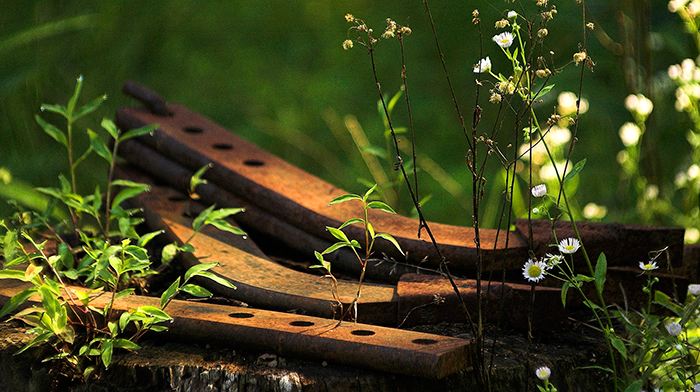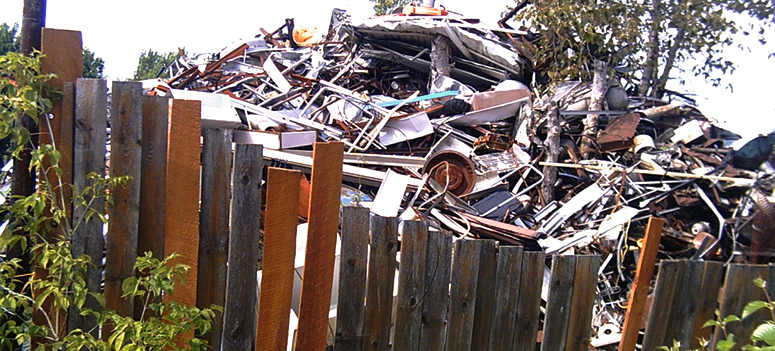Learn about the NJDPES SM2 Scrap Metal Stormwater Permit in an easy to understand manner.
The State of New Jersey maintains about 15 different stormwater permits for various types of facilities, of which 11 are for "industrial" facilities. Unfortunately the information you normally get from the NJDEP on these various permits can be confusing, contradicting, or oftentimes wrong.
Add in the fact that most NJPDES stormwater permits are expired with no replacement permit in sight, this can be an uphill battle in order to get into compliance.
We've found that one particular permit that gets a lot of attention in New Jersey is the SM2 Scrap Metal Permit, a NJPDES permit specifically for the scrap metal industry.
At its heart, it's a fairly simple to understand permit, but the language, and usage of the permit, often confuses many people. So, let's break down what you need to know about this permit.
What is the New Jersey SM2 Scrap Metal Stormwater Permit?
Right off the bat, let's get this crystal clear: this permit is not the same as the Vehicle Recycling General Stormwater Permit. They are two very, very different permits. Got it?
This permit is a NJPDES stormwater permit created specifically for scrap metal facilities across the state. It can only be used at a scrap metal facility, and in most cases, is the logical and easiest permit to use.
This permit, like every other stormwater permit in New Jersey, comes with important restrictions and conditions that you need to know before you can obtain permit coverage. Let's check out a few specifics of the permit:
- This stormwater permit replaces the older SM permit, which is no longer available. It's gone, you can't use it anymore, so stick with referring to the SM2 Scrap Metal Permit.
- Like I said, this is only for facilities engaged in scrap metal recycling, with or without vehicle recycling activities also occurring. If you're a scrap yard that accepts metal and vehicles for further processing, then this permit is specifically for you.
- If you do any additional types of recycling, you might not be able to use this permit. You'll most likely be looking at coverage under an individual New Jersey stormwater permit.
- If you do metal shredding, you cannot use the SM2 permit. Again, you'll need an individual stormwater permit.
- The SM2 Scrap Metal Permit covers both surface water discharges (stormwater that runs into a ditch, stream, lake, wetland, sewer system, etc.) and groundwater discharges (water that gets absorbed into the ground from a basin or similar area). Discharge points can be on-site or off-site.
- The SM2 permit was issued on 7/25/13, became effective 10/1/2013, and is good until 9/30/18. This permit was written once for any facility that can use it. When it expires the NJDEP should replace it with a new permit, but their track record isn't too good on that right now. Most New Jersey stormwater permits are expired, anywhere from a couple of months to over 5 years.
Let's look at some finer details of this permit.

SM2 Scrap Metal Permit & SWPPPs
Like all other general stormwater permits, this permit requires that you prepare a Stormwater Pollution Prevention Plan, or SWPPP. Unsure what that is? Check out this article on What is an SWPPP? Your plan must be prepared and implemented before permit coverage takes effect, and has to include certain general and industry-specific stormwater BMPs to reduce or eliminate pollution in stormwater.
This permit also requires a Drainage Control Plan, or DCP. This plan manages stormwater on your site by controlling runoff and directing it through whatever means necessary to one or more controlled, identified, and monitored stormwater outfall locations. This is usually accomplished by things like berms around the perimeter of your site to direct runoff to outfall points, site grading, swales, curbing, etc. The idea is a defined number of identified outfalls that can be monitored efficiently vs stormwater running wherever.
There are actually two versions of the DCP required by this permit. The 'initial' DCP must be completed by October 1, 2014, while the final version of the DCP must be completed by October 1, 2015. The difference? The final version is much more complex, requiring a plan prepared by a licensed professional engineer that shows how you have achieved drainage control at your site. While the initial DCP is fairly easy to produce (also less costly), the final DCP is going to be more complicated, and cost you much more money to have produced depending on your site conditions.
SM2 Scrap Metal Permit & Stormwater BMPs
- Like every other New Jersey stormwater permit, this permit has the requirement that your facility implement a series of both standard general stormwater BMPs (best management practices, designed to reduce or eliminate pollutants in stormwater), and industry-specific stormwater BMPs.
- The general BMPs include things like housekeeping practices, spill prevention and control, maintenance activities, personnel training, and a program of regular documented inspections.
- The industry-specific BMPs include having an inbound materials quality control program (to ensure you don't allow the wrong stuff into your site), requirements on where and how you'll inspect, sort, drain and dismantle scrap metal materials and vehicles, requirements for your vehicle storage, crusher and parts and operable vehicle storage areas. In short, a lot!
- All these BMPs must be identified in the SWPPP, and implemented at your facility.
SM2 Permits' Stormwater Sampling, Testing, & Monitoring Requirements
- Here's the part most people hate… You're going to have to take samples of the stormwater runoff at your facility, regardless of whether it's a surface water or groundwater discharge.
- Starting October 1, 2015 you'll have to have your stormwater samples tested by a certified laboratory for the following pollutants:
- Total Suspended Solids (TSS)
- Chemical Oxygen Demand (COD)
- Petroleum Hydrocarbons
- Total Recoverable Iron
- Total Recoverable Zinc
- Total Recoverable Aluminum
- Total Recoverable Lead
- Total Recoverable Copper
- Polychlorinated Biphenyls (PCBs) - Just note this is only done annually.
- All monitoring data is reported quarterly to the NJDEP, even if you get bad results or sample twice in a quarter. A lot of people ask do I need to report bad stormwater samples, and if you're unsure, I encourage you to read that article.
SM2 Permit's Inspection Requirements
- This NJPDES stormwater permit requires that you conduct a thorough documented inspection of your facility once per quarter at a minimum. Here's a free tip: from our experience, the facilities that don't have problems with their stormwater, are the ones that inspect often, usually on a montly basis. I always, always recommend getting out there and inspecting your facility as often as possible.
- The permit requires that you submit an Annual Certification and Summary Report, describing the past year's activities and certifying that you are in compliance with the terms and conditions of your permit. Fairly standard and typical report, not too hard to complete, and if you've been conducting regular inspections and your results are ok, this is a walk in the park.
SM2 Scrap Metal Permit Costs
- There is no application fee, but you will pay an annual fee to the NJDEP of $2,300.
- This isn't the easiest thing in the world to do, so many people want to know how much it will cost to hire a stormwater expert to do this for them. From our experience talking to clients (and factoring in what we charge), you can expect to pay anywhere from $3,000 to $10,000 to get an expert to prepare your SWPPP and DCP for you. Of course, this number can fluctuate depending on the complexity of your facility.
- Your stormwater monitoring costs are going to be in the ballpark of $2,000 to $3,000+ annually, depending on variables at your facility.

The SM2 Scrap Metal Stormwater General Permit isn't a walking in the park.
As you can see, this isn't a simple or easy permit to have or live with. It's also not cheap (thanks DEP). However, getting into compliance is always, always cheaper than getting caught and slapped with a fine.
If you need a stormwater permit, get one. Maybe this specific NJPDES permit is your best choice, maybe it's not. Point is, you've got options…
I'm skipping the SM2 Scrap Metal Permit & getting an individual stormwater permit.
Don't like the permit, it's conditions, or it's cost? You can always go for that individual stormwater permit I mentioned above.
However, it probably isn't going to work out any better than the SM2 permit. From my experience it's more complicated, more expensive to get, has higher annual fees, and it'll wind up looking an awful lot like the SM2 permit. My advice: go with the SM2 permit.
I'm a metal shredder so which New Jersey stormwater permit do I need?
Unfortunately, that expensive, high annual fee individua l stormwater permit is your only option here. Sorry folks.
I'm really a vehicle recycler... what NJPDES stormwater permit do I need?
Good news! You could consider the Vehicle Recycling Facility Stormwater Permit.
The Vehicle Recycling Facility Stormwater Permit is really geared towards auto salvage yards, so getting covered under this might be tricky if you don't exactly fit the bill.
I'm entirely indoors and don't need any NJPDES stormwater permit, right?
I doubt there's too many scrap metal operations that could benefit from this, but the basic industrial general permit requires all stormwater contact be eliminated from source materials.
This is really for facilities with their stockpiles inside or under cover that absolutely do not come into contact with stormwater at all.
Most scrap metal operations I've seen wouldn't be able to use this, but maybe you're different. It's certainly an option if it applies to you.

SM2 Permit? What? I'm lost...
This isn't a walk in the park, and there's a reason we get phone calls every week from various facilities looking for help with their NJPDES permits.
The issue is, you need this permit, whether you want it or not. Eventually the NJDEP is going to send an inspector out to your facility and ask about it. If you have everything under control, you've got nothing to worry about.
If you don't have a permit, you're in trouble.
To learn more about this NJPDES permit, or any other NJ stormwater permit click here to contact us or give us a call at 609-693-8301 to learn how you can get into compliance today.




